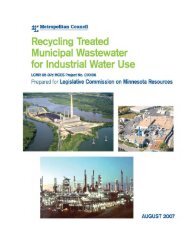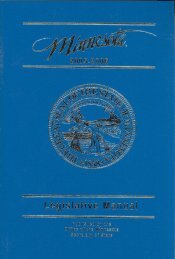Soil & Water Conservation District Guidebook 2008 - Minnesota ...
Soil & Water Conservation District Guidebook 2008 - Minnesota ...
Soil & Water Conservation District Guidebook 2008 - Minnesota ...
Create successful ePaper yourself
Turn your PDF publications into a flip-book with our unique Google optimized e-Paper software.
A premier waterfowl breeding and migration<br />
sanctuary was established on a former community gardening<br />
site in Roseville. The project, called the Woodview Marsh<br />
Wetland Restoration (pictured), was funded through a $250,000<br />
Wetland Road Replacement grant from the Board of <strong>Water</strong> and<br />
<strong>Soil</strong> Resources and additional funding from the Capitol Region<br />
<strong>Water</strong>shed <strong>District</strong>. The RCD and the Ramsey County Public<br />
Works Department created 20 acres of new-wetland habitat<br />
and Public Value Credit wetland habitat. Construction of a weir<br />
and removal of 30,000 cubic yards of soil has restored wetland<br />
hydrology on the site, and a supplemental planting established<br />
diverse wetland plant materials.<br />
Two rainwater gardens have been retrofi t<br />
within existing storm sewer systems that previously<br />
conveyed polluted storm water directly to Lake Phalen and<br />
the Mississippi River. Both projects were completed by the<br />
RCD in cooperation with the city of St. Paul. Urban runoff<br />
management is the greatest challenge to protecting and<br />
improving water quality in an urban land-use environment.<br />
Infi ltrating stormwater runoff has proven to be a cost-effective<br />
best management practice for surface water quality protection.<br />
Through a joint powers agreement with<br />
the <strong>Minnesota</strong> Pollution Control Agency, the RCD routinely<br />
inspects over 250 active construction sites within Ramsey<br />
County for compliance with permit requirements of the<br />
National Pollution Discharge Elimination System (NPDES).<br />
When necessary, the RCD assists the MPCA with regulatory<br />
enforcement and compliance. Nationwide, sediment is the<br />
number one non-point source pollutant affecting our water<br />
resources, and the NPDES permit program dramatically<br />
reduces sediment runoff from construction sites. The RCD<br />
is one of only 10 local government units that has this kind of<br />
joint powers agreement with the MPCA.<br />
Top 5 Natural Resource Concerns<br />
1.<br />
2.<br />
3.<br />
4.<br />
5.<br />
Groundwater quality/quantity protection<br />
Surface water quality protection/improvement<br />
Wetland and open space restoration/protection<br />
Urban runoff management through lowimpact-development<br />
BMPs<br />
Environmental stewardship education<br />
Future Projects<br />
Ramsey <strong>Conservation</strong> <strong>District</strong><br />
Wellhead protection plans for the cities of<br />
North St. Paul and Saint Anthony Village were developed<br />
by RCD staff as a pilot project to implement the Ramsey<br />
County Groundwater Quality Protection Plan. The plans will<br />
be used by city offi cials to insure that their fi elds containing<br />
municipal potable water wells will remain operational and<br />
free of contamination into the future. The plans contain<br />
an assessment of the geographic area from which the<br />
public wells “pull” water (wellhead protection zones)<br />
and establishes controls within theses areas to prevent the<br />
movement of potential pollutants into water supply wells.<br />
Crosby Bluff Restoration -- Crosby Farm Park is a large regional<br />
park managed by the city of St. Paul. The park is located on<br />
the north bank of the Mississippi River, bellow West 7th Street,<br />
between the 35E and Mendota bridges. A large portion of the<br />
park’s landscape is a very steep escarpment that has been severely<br />
eroded/denuded by poorly managed urban runoff that has been<br />
allowed to fl ow over the bluff. Many invasive weed species have<br />
further destabilized the bluff. As a follow-up to the Crosby Farm<br />
Park Bluff Stabilization/Restoration Study, commissioned by the<br />
RCD, the RCD will partner with the City of St. Paul Parks Department<br />
and other agencies to develop and implement construction<br />
plans to divert stormwater away from the bluff and restore<br />
the native plant community and the bluff to a stable condition.<br />
Revision of the Ramsey County Groundwater Quality Protection<br />
Plan -- With pilot funding from the Board of <strong>Water</strong> and <strong>Soil</strong><br />
Resources, the RCD prepared a comprehensive groundwater<br />
quality protection plan for the citizens’ Ramsey County Board<br />
in the early 1990s. Since this plan was adopted by the Ramsey<br />
County Board and put into effect in late 1996, many changes have<br />
occurred in groundwater use. Better information is now available<br />
on past contamination sources, the extent to which contamination<br />
has spread, and of the hydro-geologic conditions of the aquifers<br />
beneath Ramsey County. In <strong>2008</strong>, the RCD hopes to revise the<br />
current plan to refl ect the changes to our groundwater system.<br />
131
















